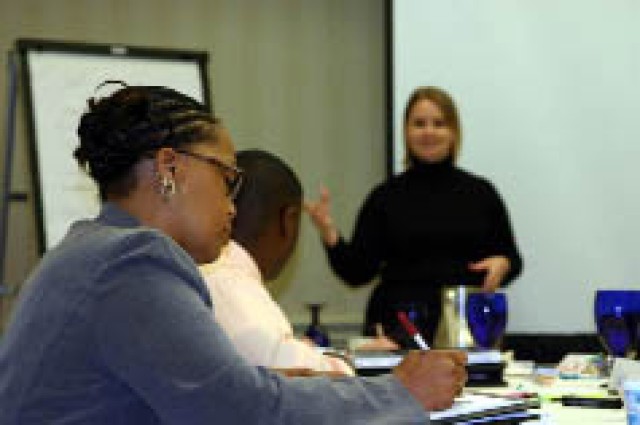FORT MCPHERSON, Ga. -- With 25 years of experience, the Army Family Action Plan (AFAP) program has good reason to boast - it's making real changes happen.
Celebrating a quarter century of supporting Army families, U.S. Army Forces Command (FORSCOM) held its annual AFAP conference in Atlanta March 23 through 26. The result was an announcement of the top five voted-on issues for 2009.
Warriors in transition primary care managers, Permanent Change of Station or temporary duty for training courses, barracks security, surviving spouses TRICARE benefits and urgent care services were the top five topics chosen to be pushed forward for resolution.
The AFAP, created to help Army leaders address the needs and concerns of the total Army Family, has led to changes in Army programs and services, policy and legislature.
Among the programs that have been amended through the AFAP in the past are an increase in the Servicemembers' Group Life Insurance from $50,000 to $200,000, military participation in the Federal Thrift Savings Plan, DoD Reserve Component Family member ID cards, elimination of TRICARE Prime co-payments, TRICARE For Life for seniors over 65, allowing Soldiers to request tour stabilization if they have a graduating high school senior and wounded Soldier updates.
"It's not just the servicemember that serves, it is every single person attached to the Army Family," said Lt. Gen. Joseph F. Peterson, FORSCOM deputy commander, at the conference's opening ceremony. "We truly understand the critical contributions that Army Families make to our country."
About 70 representatives from 23 FORSCOM installations attended the conference and collaborated to identify common issues. As the AFAP Web site explains, the program is a process that lets Soldiers and their Families say what's working, what isn't and what they think will resolve it.
Approximately 90 percent of AFAP issues are resolved at a local level; those that aren't are sent on to be discussed in mid-level conferences, such as the FORSCOM conference. Issues that cannot be decided by mid-level commands are sent on to the annual DA conference, where serious issues are sometimes brought before legislature.
According to the Web site, over the past 25 years, 633 issues have been identified through AFAP, 107 legislative changes have been passed, and 154 Army policy and regulatory changes have taken place.
"I get very excited when I get to work with the Army Family Action Plan, because I know we get a chance to make a difference," said Brig. Gen. Eric Porter at the conference, FORSCOM deputy chief of staff for personnel and installation management.
A representative from FORSCOM's human resources department explained that all - not just the top five - issues discussed at this years' conference will be presented to the FORSCOM commanding general, Gen. Charles C. Campbell.
The representative also explained that having delegates from throughout the U.S. helps commanders and families realize that some problems are nationwide.
"A host of issues have been raised from the grass roots," said Campbell. "It was a great and successful conference; the delegates did great work."


Social Sharing